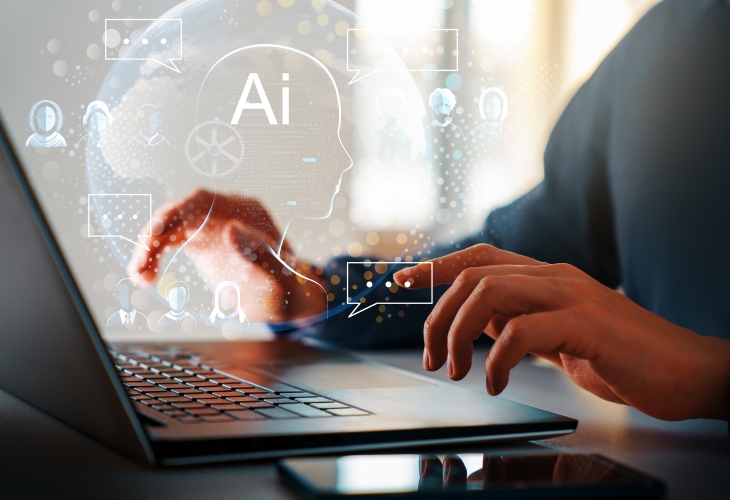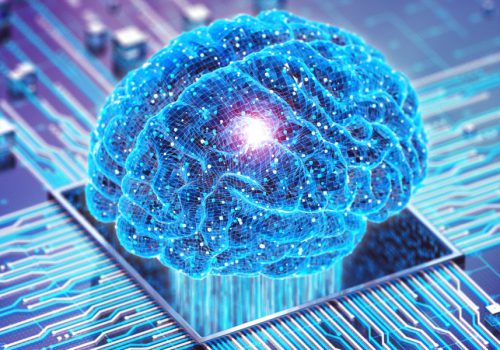In the realm of technological innovation, artificial intelligence (AI) has emerged as a transformative force, revolutionizing industries and reshaping the way we interact with the world around us.
In the speedily evolving landscape of technology, the integration of artificial intelligence (AI) has become a driving force behind groundbreaking innovations promising efficiency, convenience, and enhanced capabilities. From self-driving cars, and entertainment to personalized medical treatments, AI’s capabilities are composed to revolutionize industries and elevate human experiences. However, as AI’s reach extends further into our lives, the intricate interplay between ethical considerations and technological advancements becomes progressively more pronounced.
Unveiling the Potential
Artificial intelligence has opened doors to a world of possibilities that were once relegated to the realm of science fiction. The ability to analyze massive datasets in realtime, recognize patterns, and make informed decisions has propelled AI into sectors ranging from healthcare and finance to transportation and entertainment. Innovations like smart virtual assistants, predictive analytics, and autonomous systems have already transformed the way we live and work. For example, in the healthcare realm, AI-driven diagnostic tools can rapidly analyze medical images, supporting doctors in making accurate diagnoses.
The financial sector benefits from AI’s ability to assess risks and track market trends with remarkable precision. Self-driving vehicles hold the promise of safer roads and reduced traffic congestion, offering a glimpse into a future where mobility is transformed. These advancements are driven by data-centric algorithms, which have the potential to transform industries and enhance human lives.
The Ethical Landscape
The fusion of AI and innovative technologies has brought forth unprecedented advancements that have the potential to reshape industries and improve human lives in numerous ways. While AI’s potential is awe-inspiring, the integration of AI into innovative technologies raises ethical concerns that demand careful consideration.
As AI systems become more sophisticated and capable of performing tasks once exclusive to human expertise, questions arise about the impact on employment, privacy, bias, and decision-making transparency. The promise of increased efficiency and productivity must be balanced with concerns about job displacement, potential discrimination embedded in algorithms, and the erosion of human capabilities.

1. Job Displacement and Reskilling
One of the most pressing ethical concerns surrounding AI is the potential for job displacement. This has become a prominent concern as AI-powered automation threatens certain job categories. Clearly, with AI-driven automation continually reshaping industries, certain roles may become redundant, leading to unemployment for many. However, history has shown that technological advancements can also create new opportunities. Striking a balance between technological progress and maintaining a stable workforce becomes a vital challenge. Hence, the focus must shift towards reskilling and upskilling the workforce to adapt to these changes, ensuring a smooth transition and a future where humans and machines collaborate synergistically.
2. Bias and Fairness
Bias poses a notable ethical dilemma in the realm of AI development, as the impartiality of AI systems is inherently linked to the fairness of the data upon which they are trained. As algorithms learn from historical data, any biases present in that data can be perpetuated or even amplified by AI.
Ethical issues arise when these AI systems inadvertently perpetuate or amplify societal biases present in their training data. From biased hiring practices to discriminatory lending algorithms, AI’s lack of understanding of complex social dynamics can lead to unfair outcomes and serious implications in areas such as criminal justice, lending, and hiring, where biased decisions can reinforce societal inequalities. It is imperative to implement strict guidelines and rigorous testing to identify and mitigate biases in AI algorithms, making fairness and equality integral to the development process.
The Opacity Challenge
One of the fundamental challenges posed by AI systems lies in their inherent opacity. As AI algorithms grow more sophisticated and complex, their decision-making processes often become inscrutable to human observers. This “black box” phenomenon refers to the difficulty in discerning how AI systems arrive at specific conclusions or recommendations. Such opacity presents a twofold predicament: it hampers our ability to fully comprehend the rationale behind AI-generated decisions and introduces a barrier to accountability.
The Impact on Privacy and Data Security
Innovative technologies powered by AI often rely on vast amounts of data to function effectively. For example, ChatGPT has used 45 terabytes of text data from a wide variety of sources, such as books and articles, as well as scraped data from a variety of publicly available websites. This volume of data has triggered the Italian Data Protection Authority to quickly investigate its sources of data.
They discovered that data used to train ChatGPT contained personal information of Italian citizens and immediately issued a ban citing concerns over inappropriate content and privacy violations with the General Data Protection Regulation (GDPR), a law established across Europe in 2018 which applies when personal data is processed and aims to protect individuals’ personal data and privacy.
Recently, the Zoom videoconferencing platform got itself in a similar tangle in Europe, however, the relevant laws in this case are the GDPR and the ePrivacy Directive, an older piece of pan-European Union legislation that deals with privacy in electronic communications.
Considering the worldwide access of AI to online data sources including personal identifiable information, balancing the potential benefits of data-driven insights with the need to protect individuals’ privacy has become a central concern. Regulatory authorities are expected to ensure that AI applications respect individuals’ rights, as well as data privacy protection laws and regulations.
The Need for Explainable AI and AI Auditing
While AI systems continue to evolve and demonstrate impressive capabilities, concerns about the lack of understanding behind their decision-making processes have spurred a call for increased scrutiny and oversight. Furthermore, the lack of transparency and accountability over the decisions made by the algorithms in certain AI models, particularly deep neural networks, has gained significant traction for explainable AI (XAI) and AI auditing.
XAI has emerged as a direct response to the opacity challenge and seeks to bridge the gap between the complex inner workings of AI systems and human comprehension. By introducing transparency into AI algorithms, XAI aims to provide insights into the factors that influence AI-driven decisions. This transparency empowers users, regulators, and stakeholders to understand the reasoning behind AI outcomes and ensures that AI’s actions align with ethical, legal, and moral standards.
AI auditing aims to shed light on the decision-making processes of AI systems, ensuring that their actions can be understood, audited, held accountable, and to address instances where AI systems make erroneous or harmful decisions.

The Crucial Role of AI Auditing
AI auditing is the cornerstone of the XAI movement. It involves subjecting AI systems to comprehensive assessments that scrutinize their decision-making processes and the factors influencing those decisions. AI audits should be designed to answer questions, such as:
- How does the AI system arrive at its conclusions? Auditing should involve dissecting the algorithm’s pathways to elucidate the sequence of steps leading to a particular decision.
- What data sources does the AI system draw upon? Auditors should investigate the data inputs used by AI, examining their quality, diversity, and potential biases.
- Are there inherent biases in the AI system? Auditors should identify and analyze any biases that the AI system may inadvertently perpetuate due to skewed training data or underlying algorithmic biases.
- Can the AI system be trusted in critical applications? Auditing should evaluate the reliability and robustness of AI systems, particularly in highstakes domains such as healthcare, finance, and autonomous vehicles.
AI auditing is not only about shedding light on AI’s decisionmaking processes but also about fostering accountability and trustworthiness. When AI systems can be audited and their operations understood, stakeholders can confidently deploy these systems in critical applications, knowing that their outcomes are predictable and aligned with intended objectives.
Moreover, AI auditing plays a pivotal role in regulatory compliance. As governments and organizations grapple with the ethical and legal implications of AI deployment, auditing provides a means to ensure adherence to guidelines and regulations, thereby mitigating potential risks and liabilities.
Moving Forward
To navigate the intersection of ethics and AI-driven advancements, a multi-faceted approach is required.
- Transparent AI: Developers must prioritize transparency in AI systems. This entails creating algorithms that provide clear explanations for their decisions, making it easier to diagnose biases and errors. Research into interpretable AI and explainable AI is pivotal in achieving this goal.
- Ethical Frameworks: Establishing ethical frameworks for AI development can guide researchers, engineers, and policymakers in ensuring that ethical considerations are embedded in the design and deployment process. These frameworks should encompass fairness, accountability, transparency, and privacy considerations.
- Bias Mitigation: AI models should be rigorously tested for biases and continuously re-evaluated as new data becomes available. Diverse teams of developers can help in identifying and rectifying bias-related issues.
- Reskilling and Education: To address job displacement, investing in reskilling and education programs can help the workforce adapt to the evolving technology landscape. Governments, academia, certification training providers, and industry leaders should collaborate to provide opportunities for skill development.
- International Collaboration: Ethical considerations are not confined by borders. International collaboration can help in developing standardized ethical guidelines that transcend regional boundaries.
The demand for AI auditing is poised to shape the trajectory of AI development. As industries integrate AI into their operations and services, the necessity for transparency and accountability becomes increasingly evident. Collaborative efforts between researchers, developers, policymakers, and auditors are crucial in establishing robust auditing frameworks and adopting comprehensive auditing practices that ensure AI systems are both innovative and accountable.
In the end, the true test of AI’s impact lies not only in its ability to innovate but also in its capacity to uphold our shared human values. As we journey into this AIinfused future, the decisions we make today will lay the foundation for a more equitable, just, and technologically advanced tomorrow.









